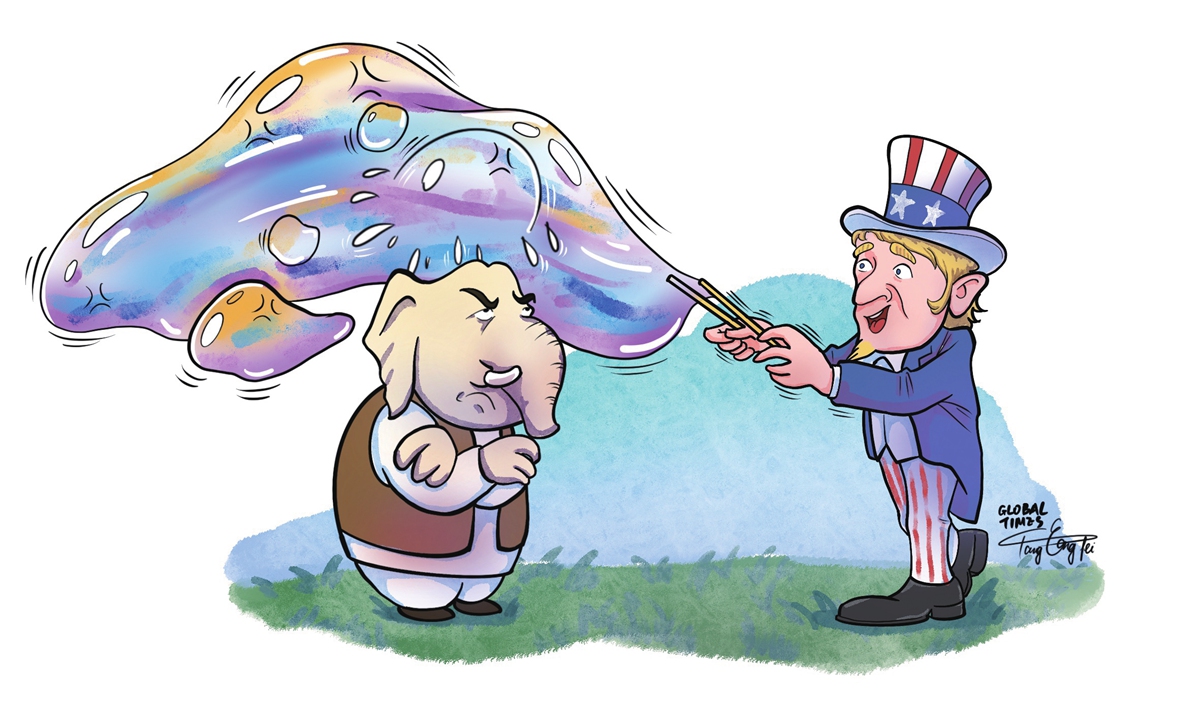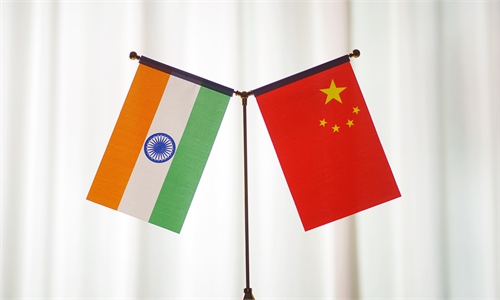COMMENTS / EXPERT ASSESSMENT
US’ empty words may be biggest risk for India’s economy

Illustration: Tang Tengfei/Global Times
White House Press Secretary Jen Psaki said on Monday that the US and India are expected to move forward on a series of initiatives in 2022, including fighting the COVID-19 and climate change, promoting the Quadrilateral Security Dialogue (QUAD), expanding trade and investment, and cooperating on new and emerging technologies.In addition, US climate envoy John Kerry reportedly may visit India this month, and the Indian government has given the green light to open markets for US pork and pork products.
Against the backdrop of the US' attempt to lure more countries into its anti-China clique, it is no breaking news that the US talks up potential cooperation with India in many areas, no matter how unrealistic it is. The reality is that Washington's calculation that New Delhi will become a formidable chess piece against Beijing may never materialize.
The reasons are simple and clear. To begin with, talks about cooperation may just well be talks because they lack any solid foundation. Washington may keep paying lip service to closer ties with India, but its fundamental "America first" policy won't change. And for India, playing into the US' hands is essentially giving up its strategic independence and forfeiting India's ambitious goal of becoming an economic powerhouse.
Both India and the US have a vast and intricate connection with China in terms of trade. India, in particular, remains highly dependent on China in about 86 categories of products, including consumer electronics, computer hardware and telecommunications equipment. Bilateral trade between India and China surpassed the $100 billion milestone in 2021 despite bilateral tension and New Delhi's efforts to cut economic reliance on China.
Some in India may believe that catering to the US, for instance, through the so-called QUAD framework, and antagonizing China could bolster its regional and global profile. But that could just be a delusion. Not even the QUAD alliance as a whole will be able to erase China's role in global trade. The US, India, Japan and Australia rolled out a so-called Supply Chain Resilience Initiative during a QUAD meeting in April 2021, which is widely viewed as a move to undercut China's heft in the global supply chain, but that has so far gone nowhere.
The flaw in such an ill attempt is that the members are out for their own interests. The US is notorious for stabbing allies in the back when it comes to economic interests. Australia is experiencing that firsthand. The country followed the US' anti-China directions and sacrificed its business interests in the Chinese market, only to find out recently that US companies are taking over market share in the Chinese market left by Australian businesses.
India also had similar experiences with the US. In 2020, the US placed restrictions on vaccine raw material exports to India, while the populous South Asian country faced severe COVID-19 outbreaks.
Taking side with the US will not be a wise choice for India from both an economic and strategic perspective. The US won't hesitate in discarding India once the South Asian country losses its strategic value.
Moreover, China won't sit back and let the pair trying to undermine its core interests. Instead of keep indulging into the US' geopolitical games, a much more crucial mission for India is to seek sound development under a peace and stable environment. And currently, the US' instigation and cajoling may be the biggest risk for India.
The so-called initiatives touted by the US in front of India are nothing more than lip services. The Indian people and their political leaders should keep a clear mind and avoid falling into the US' traps.
The author is an editor with the Global Times. bizopinion@globaltime.com.cn



